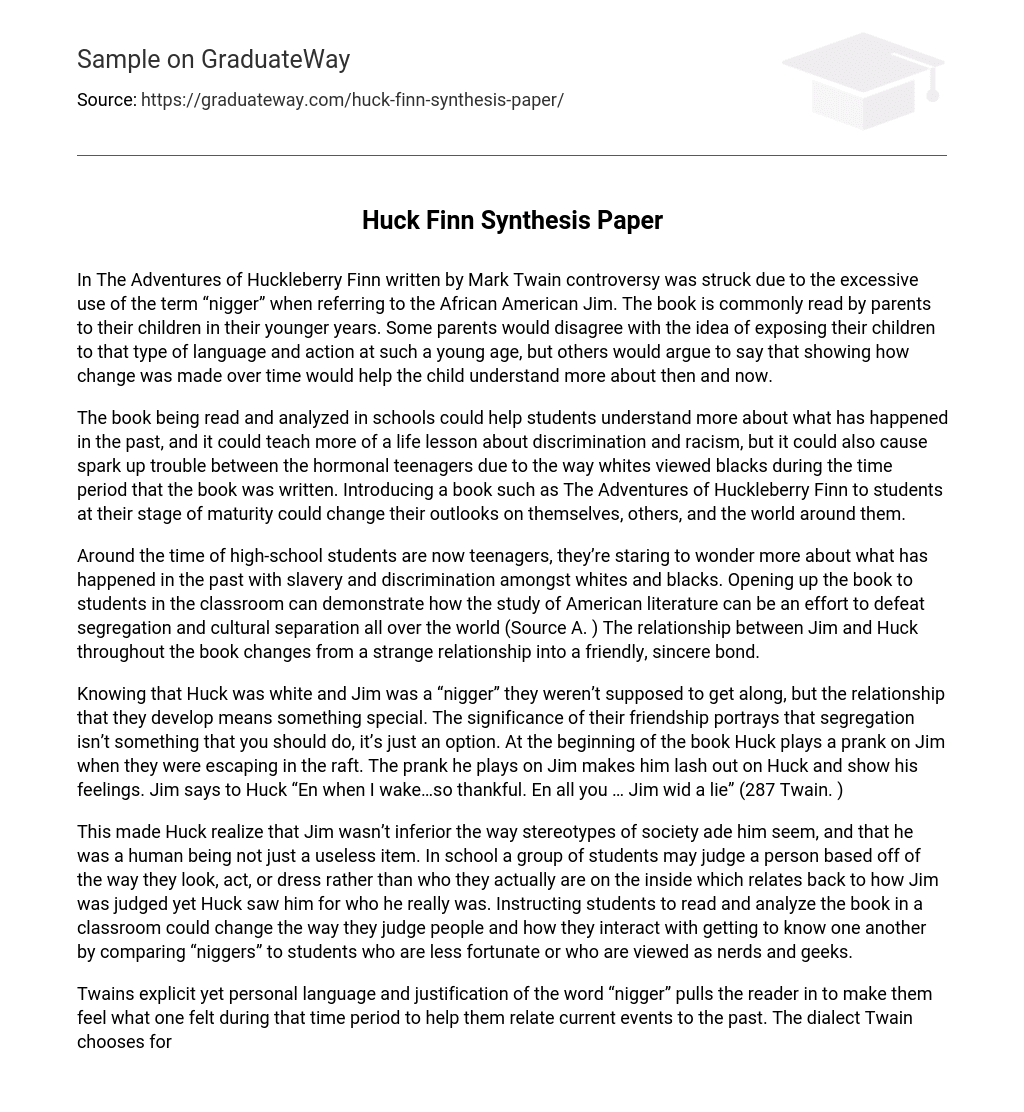Controversy arose in The Adventures of Huckleberry Finn by Mark Twain because of the frequent use of the word “nigger” when referring to Jim, an African American character. This book is commonly read aloud by parents to their young children. While some parents may object to exposing their children to this language and actions at a young age, others believe it can aid children in comprehending historical context and how societal norms have evolved.
Schools often choose books for students to read and analyze based on their ability to shed light on historical events and teach lessons about discrimination and racism. However, this choice of book can sometimes create tension among teenagers due to its portrayal of how whites viewed blacks during the time it was written. For instance, presenting a book like The Adventures of Huckleberry Finn at this stage in students’ development has the potential to reshape their perspectives on themselves, others, and the world.
Teenagers in high school develop an interest in the history of slavery and racial discrimination, as studying American literature can help combat segregation and cultural divisions worldwide (Source A). The book showcases the evolution of Jim and Huck’s relationship, moving from an unconventional alliance to a genuine and affectionate bond.
Despite the racial divide between Huck and Jim and society’s expectations that they should not be friends, their relationship has a profound meaning. It illustrates that segregation is a choice rather than a necessity. In the early stages of their journey, Huck plays a prank on Jim while they are escaping on a raft. This causes Jim to react angrily, revealing his true emotions. Jim expresses his gratitude towards Huck but also points out that Huck hurt him with a lie(287 Twain).
Huck came to the realization that Jim was not as inferior as society’s stereotypes depicted him; he saw Jim as a human rather than an insignificant object. In school, students often make judgments based on appearance, behavior, or clothing, instead of recognizing one’s true identity. This parallels how Jim was judged, but Huck truly understood him. By incorporating this book into classroom instruction and encouraging students to read and analyze it, their judgmental attitudes can potentially change for the better and enhance their interactions with peers. They can draw connections between the treatment of “niggers” and less fortunate or socially labeled individuals such as “nerds” and “geeks”.
Twain’s use of explicit but personal language and his defense of the word “nigger” engages the reader, enabling them to experience the emotions of that time and establish connections between present events and the past. Through Jim’s dialect, Twain illustrates the limited education of black people and helps readers comprehend the reasons behind their societal perception. During a conversation, Huck’s explanation of French men speaking a different language utterly baffles Jim, who finds it ridiculous since it deviates from what he knows (Twain 69).
The segregation and mistreatment of whites and blacks created obstacles for African Americans to acquire basic skills like reading and writing. The denial of education to blacks resulted in their devaluation and being seen as insignificant. Despite Jim’s intelligence and moral compass, his worth was still undermined merely because of his skin color. As mentioned in Source C, education was synonymous with civilization, yet black individuals were denied access to education during that era due to pervasive racism.
Reading The Adventures of Huckleberry Finn can evoke a deep understanding of the pervasive discrimination and racism that Jim, a former slave, endured. This powerful experience can alter one’s perception of contemporary events. However, introducing this book to teenagers may not be advisable due to their limited knowledge of the slavery era. African American students may feel demeaned and insulted when forced to read it in a classroom setting (Source C). Twain’s use of derogatory language like “nigger” and negative portrayal of Jim reflects a time when black identity was undefined (Source B). Consequently, African American students may feel degraded and tensions could arise in an integrated classroom. Misinterpretation of the frequent use of the word “nigger” could even incite an uproar, as it may offend black students or give white students the misguided impression that it is acceptable to use such derogatory language against African Americans, mimicking Twain’s text.
According to Source C, Twain’s portrayal of blacks is considered effortless as he portrays Jim as lacking self-respect, dignity, and a separate sense of self (Source C). Twain’s characterization of Jim may make whites feel comfortable and enhance their perception of humanity (Source C). If the book is not properly analyzed by a teacher, misconceptions can arise and corrupt the school environment, unless the students make an effort to understand the book.
According to Source C, The Adventures of Huckleberry Finn is widely recognized as a classic American novel. Despite the potential for misinterpretation, it remains a crucial piece of literature in the classroom. The novel provides valuable lessons on racism, segregation, and slavery. By discussing the book with a group of students, educators can enhance their understanding of historical events and the impact they have on society today. Therefore, high school English teachers should strongly consider including this novel in their curriculum.
Works Cited
- Alberti, John. “The Nigger Huck: Race, Identity, and the Teaching of Huckleberry Finn. ” College English 57. 8 (1995): 919-37.
- JSTOR. Web. . Gregory, Leslie. “Finding Jim Behind the Mask: The Revelation of African American Humanity in Mark Twain’s Adventures of Huckleberry Finn. ” (1998): n. pag. Florida Gulf Coast University. Web.
- Lester, Julius. “Morality and Adventures of Huckleberry Finn. ” Twentieth-Century Literary Criticism 161 (2005): n. pag. Gale. Web. . Twain, Mark. Adventures of Huckleberry Finn. New York: Random House, 1996. Print.





